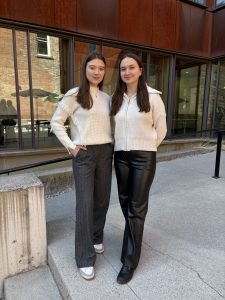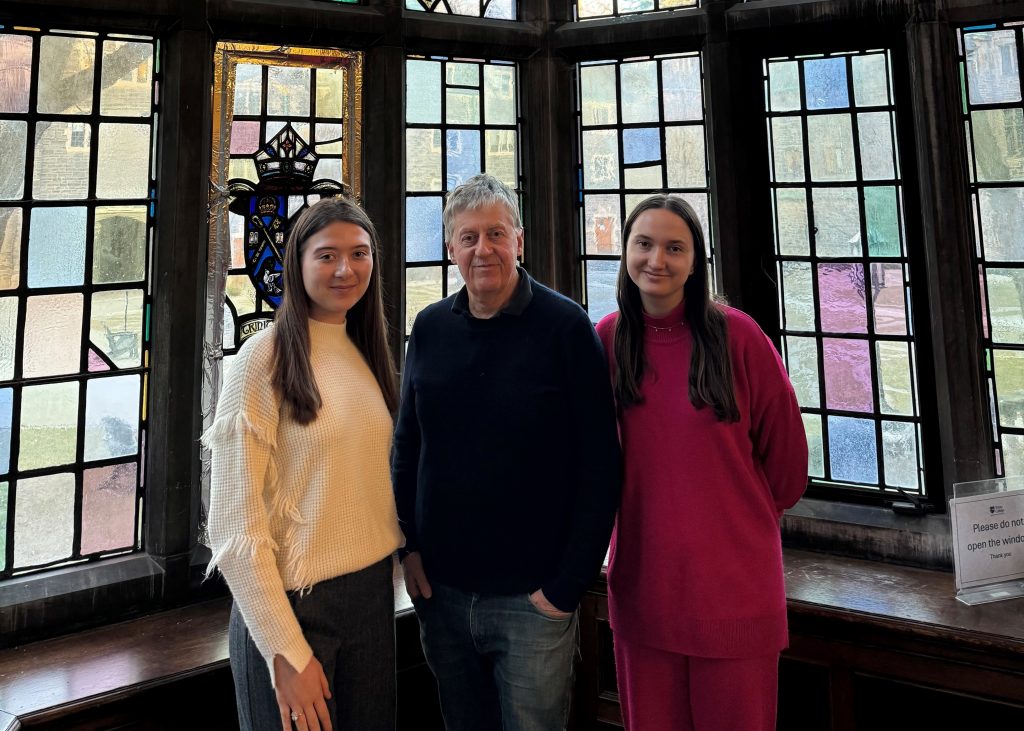
Anna Didenko and Anastasiia Desna are living through a Black Swan Event. The term, used here to describe Russia’s invasion of Ukraine, comes from Professor Robert Owen’s research that describes how impactful and unpredictable phenomena affect economic and social systems. Other examples include the COVID pandemic, the Fukushima energy disaster, and the sub-prime mortgage crisis. Didenko and Desna, students from the University of Kyiv, are finishing their terms working with Professor Owen through a research internship program funded by Mitacs.
The Globalink Research Award Program funded the pair’s valuable contributions to the project.
“From a faculty member’s perspective, it is particularly helpful to benefit from focused full-time research assistance during the academic year, when most U of T students are highly committed in terms of their overall activities,” said Professor Robert Owen.
Under normal circumstances, Mitacs’ Globalink Research Award program creates partnerships and signed agreements with specific research entities, or governments, in various countries to allow undergraduates in their last year of study to do research in Canada for the summer. The program was adapted for Ukrainian students upon the outbreak of war.
“We had a special relationship with the Ministry of Education and Science of Ukraine that allowed the students to, given the situation with the war, leverage this opportunity to facilitate partnerships and deepen their academic ties to Canada,” explained Modupe Olufemi Mitacs’ Advisor of Business Development. “Unlike other partnerships where the other government, or research entity, co-funds these projects, Mitacs fully funded these in partnership with the Ministry of Education and Science. We made exceptions for Ukrainian students, such as allowing them to apply from within Canada and expedited research review processes.”
For Didenko and Desna, the program created opportunities during a time that it was increasingly difficult to remain in Ukraine and culture shock awaited in Canada.
“I applied for a CUAET visa (Canada-Ukraine Authorization for Emergency Travel program), and after I received it, I decided it was time to go because I could no longer stay in Ukraine. My family understood that I needed to move forward,” Desna said. “When I came here, I realized that I couldn’t just sit and wait. I needed to immediately explore further opportunities. I immediately applied to a program for Ukrainians at the UofT and spent a semester at the Mississauga campus. I soon realized the system is completely different!”
While the situation in Ukraine remains dire, the Mitacs program has helped to provide stability upon their arrival in Canada.

“The Mitacs program opened the students’ lives to another world of much calmer academic reflection and scholarship with extraordinary resources,” Owen said. “The uniquely privileged academic setting at a leading university, such as U of T, is something that can be taken all too frequently for granted.”
Both Desna and Didenko have studied at UofT for a semester each through special programs for Ukrainians fleeing the war, but they are not currently enrolled as international students. Instead, they are both completing their undergraduate work online at the University of Kyiv, a situation that requires them to work through the night in an opposite time zone.
“Anna and Anastasia’s weeks typically include virtual classes in the middle of the night, sometimes starting at 1:30 or 2 am,” Owen explained. “Such a demanding schedule is then combined later in the day with research project work, relating to technical aspects of a new field of inquiry, called elemental nanoeconomics. That is far more than a standard 8-hour workday format.”
Throughout the term, Desna and Didenko have managed the balancing act required by their bi-continental schedules.
“We have a pretty great partnership with Professor Owen because we all try to find an appropriate time to work together,” Didenko said. “He understands our situation, that we still have our home university courses to do, but we are also doing our best to complete the project.”
The project is deeply connected to the students’ own current experience.
“We look through different events happening around the world and how they influence the economic situation of countries, economies, and policies,” Desna explained. “It’s a real-world matter because Black Swan Events happen all around the world every day. If we understand how companies manage to deal and cope with these events, it will help agents deal with problems more easily and effectively.”
The students have been focused on developing the skills required to conduct high-level research while still undergraduates.
“Their assistance has involved the preparation of complex diagrams and graphs, as well as providing critical feedback regarding drafted research presentations and writeups,” Owen said. “Another important facet of their work has entailed literature reviews and identifying specific research findings in existing literature.”
While both Desna and Didenko hope to continue their studies at the graduate level, hopefully at the University of Toronto should funding for holders of CUAET visas become available, it is not a financially viable option under current admissions requirements. Meanwhile, the Mitacs internship program they are currently involved with is undergoing changes.
“The Globalink Research Award program is changing to simplify and make it more accessible, moving away from special partnerships with other organizations,” Olufemi explained. “Ukrainian students can still benefit from the Globalink Research programs. We still make exceptions for Ukrainian students who may already be here, but now there has to be a formal exception request process.”
With the program about to end, and with it more uncertainty on the horizon for Desna and Didenko, the students are more apprehensive than frightened about what’s next for them.
“It’s all been about getting research experience,” Didenko said. “Along with this, I developed my network here and learned how everything works. It would be an amazing chance to study here at the master’s level, but until then, this program has been a great chance to be part of the University of Toronto.”
Return to the Department of Economics website.
Scroll more news.
